Being like your mother can be admirable, but when it comes to genetics, it can also be dangerous for women’s brain health, according to a new study that offers new insights into the active X chromosome and its effects.
Researchers from UC San Francisco aimed to understand how the active X chromosome in mice brain cells influenced their performance, and in new research, found that brain cells expressing only the maternal X chromosome experienced significant impairments, with memory and cognitive abilities deteriorating more rapidly than those expressing chromosomes from both parents.
Chromosome Activation
Men inherit one X chromosome from their mother and a Y chromosome from their father, while women inherit an X chromosome from each parent. In women, every cell uses either the maternal or paternal X chromosome, with the other becoming inactive. Since men inherit only the maternal X, this distinction could provide crucial insights into brain aging differences between sexes and among women.
Previous studies have suggested a link between the X chromosome and brain health. Mutations in the X chromosome are strongly associated with certain disabilities. Women with Turner Syndrome—a condition in which one X chromosome is missing—frequently experience cognitive challenges. This reliance on a single X chromosome may explain why men face higher risks for brain diseases and cognitive impairments, such as verbal memory deficits.
“Given the fact that the X chromosome is enriched for brain-related genes, it became very important for us to know what roles it might be playing in brain aging,” said Samira Abdulai-Saiku, PhD, a UCSF postdoctoral fellow and first author on the paper.
Developing a Brain Health Study
Abdulai-Saiku collaborated with lead author Dena Dubal, MD, PhD, a professor of neurology at UCSF, on the study. The researchers wanted to determine if the parental origin of the X chromosome affected cell performance. During conception, chemical markers identify whether specific genes on a chromosome originate from the sperm or egg, helping determine gene activation in cells.
“Skewing of the X chromosome is common among humans, and there are certainly women who are walking around with much higher or lower levels of maternal X chromosomes than others, just by chance,” said Dubal. “There has been little research on the potential consequences of this.”
The team used gene editing techniques to breed two groups of mice for the study. One group only expressed maternal X chromosomes, while the other activated a mix of X chromosomes from both parents.
“Our greatest challenge was finding a way to compare the maternal X to the paternal X,” Abdulai-Saiku told The Debrief. “To address this we had to develop a protocol to successfully separate the maternal X from the paternal X. We used a technique known as fluorescence activated cell sorting to separate neurons.
“Once the mice reached the appropriate age, we continued to troubleshoot and modify our protocol until we were consistently able to collect a sufficient quantity of intact neurons for both RNA-seq and epigenetic studies,” Abdulai-Saiku added.
Brain Health Findings
Mice that only possessed active maternal X chromosomes exhibited more rapid declines in memory and learning as they aged. The hippocampus—a brain region crucial for memory and learning—was particularly affected.
“What we showed is that these animals’ brains were really aging faster than the brains of their genetically identical sisters who had both mom’s and dad’s X chromosomes turned on,” Dubal explained.
When analyzing the brain cells, the team discovered specific genes were turned entirely off on maternal X chromosomes while activated on paternal chromosomes. By activating the silenced genes on the maternal chromosomes using CRISPR gene editing technology, the mice experienced considerable improvements in their cognitive abilities in old age.
Analyzing Cognitive Decline
“Together, all these experiments suggested to us that the parental origin of an X chromosome can have a big impact on brain health,” Abdulai-Saiku said. “For me the most unexpected finding was that the parent-of-origin of the active X could affect the gene expression profile of neurons in a very significant manner. This was particularly striking because the neurons were taken from the same brain and thus had developed in the same environment.
“This suggests significant epigenetic differences between the maternal and paternal X since the 2 X chromosomes have identical gene sequences,”Abdulai-Saiku added.
Although the exact mechanisms by which the maternal X chromosome influences brain aging remain unclear, the researchers hypothesize that the silenced genes may provide some advantage earlier in life.
“It may be that this gene expression pattern is actually really beneficial to brain development, but then there is this tradeoff later in life,” Dubal said.
Identifying and Treating Cognitive Decline
The researchers believe their findings could help improve quality of life as people live longer, a growing concern with advances in medical science.
Abdulai-Saiku highlighted that the study represents an early effort to explore how the parent-of-origin for the X chromosome influences cognitive decline in aging, and identifies potential factors on the X chromosome that could improve resilience to cognitive decline, opening new paths for therapies targeting aging-related cognitive issues and neurodegenerative diseases.
“These findings raise the possibility that some women who express more of their mom’s X chromosome just by pure chance may have more cognitive impairment with aging or an increased risk for diseases like Alzheimer’s,” Dubal added. “Ultimately, it could also help us find constructive strategies for slowing brain aging in both sexes.”
Future Work On Brain Health
Dubal told The Debrief that the team will continue their work on X chromosomes and the brain, and that she believes one of the next most-necessary steps will be to identify the chromosomal issues identified in the research. “The X chromosome you inherited from your mom is turning off genes, accelerating aging, and impairing cognition,” she said. “Can we reverse this?”
“All the data in the paper have focused on females in cognitive aging,” Abdulai-Saiku added. “One of the big questions we have involves how the parent-of-X origin impacts sex differences in cognitive aging since men only have one X that is always maternal X. We are also very interested in how the parent-of X origin affects vulnerability to neurodegenerative diseases like Alzheimer’s disease and is this different for men and women.”
The paper “The Maternal X Chromosome Affects Cognition and Brain Ageing in Female Mice” appeared on January 22, 2025 in Nature.
Ryan Whalen covers science and technology for The Debrief. He holds an MA in History and a Master of Library and Information Science with a certificate in Data Science. He can be contacted at ryan@thedebrief.org, and follow him on Twitter @mdntwvlf.

